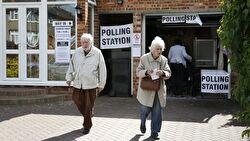
Jeremy Paxman: When were you told of this change of plan?
Chloe Smith: Well, as a minister in the Treasury and indeed
dealing with fuel matters this has been under consideration for some time …
JP: When was the decision taken?
CS: As I say it's been under consideration for some
time …
JP: When was the decision taken?
CS: … the chancellor and the prime minister …
JP: … yes of course …
CS: … take these
decisions between them.
JP: So when were you told, then?
CS: I've been involved in this for some time and …
JP: But you didn't take the decision, obviously, you
said the chancellor and the prime minister did, so when were you told?
CS: We had a, uh, collective discussion of that, er,
er, in due course and although I can't, you know, give you the sort of full
gory …
JP: Well did it happen today?
CS: … details of the processes … I can't, I can't, I
can't, sit here …
JP: You can't remember?
CS: … and tell you the ins and the outs, no, it's
not appropriate for me to tell you the ins and the outs.
JP: Well, why isn't it appropriate? You're coming
here to defend a change of policy and you can't even tell me when you were told
what the change in policy was.
CS: Because, as a minister in the Treasury I've been
involved in the discussions for some time, as I've said to you the chancellor
and the prime minister take those decisions, I'm not going to be able to give
you a running commentary on exactly who said …
JP: I'm not
asking for a running commentary, I'm asking for a statement of facts about when
you were told. You were told some time today, clearly. Was it before lunch or
after lunch?
CS: I'm not going to give you a commentary of who
says what and when. That's about how government policy is made behind the
scenes.
JP: I just want to know when you were told. I'm not
even going to ask you who told you but when you were told what the change of
policy was.
CS: This has been under discussion for several
weeks.
JP: Right, and at some point during those several
weeks they communicated to you that there had been a decision to change the
policy.
CS: Indeed, and today in front of parliament we, we
revealed to parliament, as is right and proper by the way, to parliament, that
we were planning to help households and businesses in this way.
JP: Is it hard for you to defend a policy you don't
agree with?
CS: It's not that I'm afraid, Jeremy. Nice question.
I do agree with it. I think it is very important to help households.
JP: You didn't in May.
CS: And businesses …
JP: You didn't in May …
CS: Go on.
JP: Alright. In
May you said it is not certain that cutting fuel duty would have a positive
effect on families or businesses. So what's happened?
CS: I think the point to be made out of that, and
out of what's then been said today is that it's important to do what you think
you can to help households and businesses. In a world that we are facing, and I
think your intro pulled some of these scenes out, in the world that we are
facing, where things are very hard for households and businesses you have to do
what you can, and you have to do that in good faith so that they can get the
help that they need in these hard times.
JP: But you said that it wasn't certain "that
cutting fuel duty would have a positive effect on families or businesses".
That was on the 23rd of May, now what's happened between the 23rd of May and
today which is, what, the 25th of June?
CS: Jeremy, I don't think many things are certain in
this world. I think the point is, on that for example …
JP: There are a lot of uncertainties here, you …
CS: Families or businesses could even save the money
they kept from less on fuel duty … there are lots of different ways that could
pan out for families and businesses, but it's important the government does
this …
JP: Why didn't the transport secretary know about it
yesterday?
CS: It's important that the government – [coughs]
excuse me – it's very important that the government uh, acts on concerns it
hears, and as I said about, about who, what and when, the government will make
its policy and importantly come to parliament with it.
JP: Isn't the cost of petrol in people's cars a
matter of legitimate interest to the transport secretary, who didn't know
yesterday?
CS: Of course it is. It's a matter of legitimate
interest to households and businesses, but of course, as you know, tax is for
the chancellor and in this case the chancellor and the prime minister took the
decision.
JP: OK, it's going to cost you say now about £550m,
in contrast with your figure on 23 May, which was about £1.5bn. What, you just
got the sums wrong, did you?
CS: No they actually refer to two slightly different
things. The question being asked in May I believe was about a full cancellation
and of course as you will be aware from today we have been talking of deferring
the August rise to January.
JP: It's specifically about the August increase
actually, the £1.5bn that you referred to and now you say is £550m. Can you
tell us from which departments that gap is going to be made up?
CS: Well as we've said today it will be made up – it
will be drawn from – and around £500m is the correct figure as we're talking
about a deferral, the figure will be drawn from underspends in departmental
budgets.
JP: Yes. Where?
CS: Well there are a number of those available. We
know, for example, this year, that if you look at the public sector data
released only today, we know that underspends are going, we know that the rate
of spending is less than the OBR was forecast, those figures are there today.
JP: Where?
CS: We know also that last year there was 4bn of those,
so they are available...
JP: Which department is it going to come from?
CS: They fall across and in different ways and that
figure will progress, if you like, through the course of the year …
JP: Well just
name me a few departments.
CS: No, I won't do that because …
JP: You don't know?
CS: … we'll be giving you the full details in the
autumn statement …
JP: Are you waiting to be told that as well?
CS: No, because …
JP: You know do you? You know which departments have
underspent?
CS: It is not possible to give you a full breakdown
at this point because the figure is evolving somewhat, as per the data today,
the data is available monthly in that particular instance.
JP: We are clear that what you are looking for now
is 500-odd million pounds, you say that various government departments are
underspending, although you are unable to tell us which ones. Presumably you do
know but are choosing not to tell us. Is that correct?
CS: It's an aggregate figure. If you look at the
data today it's an aggregate figure.
JP: Fine. You're choosing not to tell us which
government departments have underspent.
CS: It's an aggregate figure, and I think that's
what's important here. The figure says there is enough underspend there to fund
a policy like this and what's really important is when we see that kind of
funding available we want to spend it for the good of the households and
businesses.
JP: And can you just confirm to us that the number
one priority of the government is reducing the deficit.
CS: It is indeed, and the fact if I may …
JP: That's the number one priority?
CS: The facts of using underspends for this means
that our plan is absolutely intact and that is rightly what we seek to use for
the credibility of our fiscal plan.
JP: Is this some kind of joke? I mean how can you
possibly have as a number one priority cutting the deficit when you choose to
spend an underspend in funding a tax cut or failure to implement a tax rise
that was scheduled?
CS: The plan overall has not changed, the plan
overall remains those departmental budgets as they were laid out and those have
not changed. We're looking to use the underspends, however, in a way that is
really valued by households and businesses and think anyone listening tonight
who drives a car does know that.
JP: We learned today that government borrowing
increased by, was it, £3bn … in May? £3bn, no £3bn is about forecast, wasn't
it?
CS: For reasons that are interesting in themselves.
JP: I'm just wondering why you didn't you, you know,
use this money to do something like paying that down?
CS: Well, the figures on the other side of that
public sector data release today are quite interesting in themselves, they do
relate to rather one-off factors. Specifically in terms of when some payments
were made between May and June. That is of interest perhaps in a different
conversation but the fact is here that we are sticking to the overall plan and
taking the opportunities we have to help households and businesses.
JP: Do you ever wake up in the morning and think, my
God, what am I going to be told today?
CS: I wake up in
the morning and know, actually, that some of my constituents will really value
not having to pay that little bit more on fuel prices, come August, because the
cost of everything is pretty tight at the moment and everybody does know that.
I do think this move today is valuable. It's not just a Westminster Village
story Jeremy, it's real money in real people's pockets.
JP: Oh, we all understand that.
CS: Good.
JP: You ever think you are incompetent?
CS: I think it's valuable to help real people in
this way and I do think that is valued by people who drive.
JP: OK. Chloe Smith, thank you.
Article courtesy of The Guardian. Original found here.



